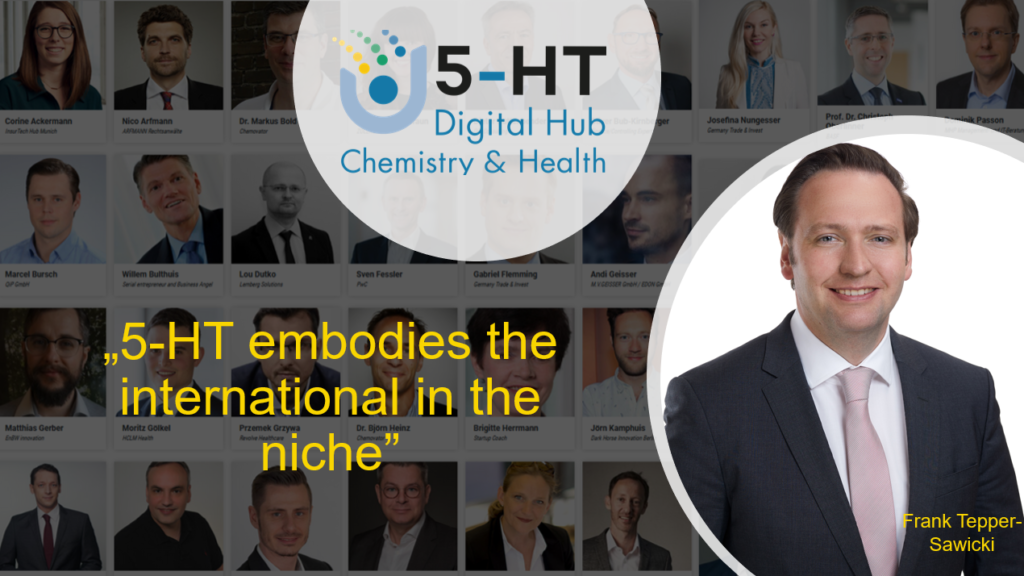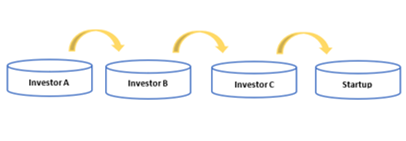"The international in the niche: this is what 5-HT embodies particularly well"
Katharina Kittelberger
People don't talk about money? We do! In this interview with attorney Frank Tepper-Sawicki, he explains how to help startups and investors navigate the complex world of venture capital financing contracts in the form of equity financing.
Frank Tepper-Sawicki has been a lawyer for over twelve years and is now a partner at the world's largest business law firm Dentons, where he works in the Corporate/M&A/Private Equity/Venture Capital department. He mainly accompanies deals as well as investments for financial investors or strategists who invest in or buy up startups or their technologies. For several years, he has also been involved as a mentor for technology and growth companies.

"Especially in the field of venture capital financing, certain standards prevail on the "market", which one should know at least in basic terms. Otherwise, it will be difficult to make the right decisions for the success of the young venture or investment; especially in negotiations, when alternative solutions are sometimes unknown." For this reason, according to Tepper-Sawicki, the question of one's own strategy should be clearly answered from the outset: "What goal are my investors or I as an investor pursuing in venture capital financing?"
"The problem many young companies face is this:
If someone has studied biochemistry, for example, the focus was accordingly more on scientific work. If the person now decides to found a startup, a veritable hurricane of previously most likely little-known legal and tax regulations comes their way.
But even large and medium-sized companies that invest in a startup as part of their digitalization of their business model with strategic interest - sometimes only after an initial collaboration - or even with purely financial interest as part of equity financing, often do not properly appreciate the pitfalls of venture capital investments.
It is not uncommon for these companies to then make use of their resources from M&A (legal, tax and corporate finance), which, however, are often not familiar with the typical, sometimes very extensive regulations and dynamics of the respective venture capital market. Inevitably, in the absence of market knowledge, a venture capital investment becomes even riskier with a view to the intended success, which is then also more frequently accompanied by sustained futile expenditures."
"An important topic that should be addressed sooner rather than later”,
for him is therefore the creation of reliable, contractual foundations between early-stage startups and their contractual partners - especially those who could also be later strategic investors.
"In the early stages, financial resources are often scarce. That's why many don't take it for granted to invest money in the work of a lawyer in this situation, although that's exactly what would make sense. Because I believe that in this way value-preserving measures are taken, for example, to secure intellectual property. If the contractual foundation is created, startups can fully direct their focus on what's important: growing through innovation, growth management and sales, and thus increasing their value."
When does it make sense to turn to you as a startup or as an investor?
"At the latest when a term sheet is to be drafted or one is on the table, a startup or an investor should seek the opinion of a lawyer experienced in the field of venture capital. Unlike in M&A deals, the largely non-binding term sheet of a venture capital investment is decisive and formative for the design of the subsequent contractual documentation and the course of negotiations.
Before signing, it should be clear exactly what is being signed.
"Many underestimate how complex and how important some venture capital regulations are for the respective investment, namely to secure the respective stake with profit as proceeds (so-called return on investment). Even if the contractual bases are partially renegotiated in the context of each follow-up round, one should nevertheless secure and at best strengthen one's own negotiating position at an early stage - both as an investor and as a founder. Anyone who underestimates this will, in many cases, not see much of the proceeds achieved in the end," Tepper-Sawicki explains vividly:
The water has to reach the respective pot, otherwise, everyone else is happy, except me.
 The waterfall principle: basin after basin fills up until the water ultimately reaches the founders
The waterfall principle: basin after basin fills up until the water ultimately reaches the founders Tepper-Sawicki helps to ensure that the party involved and represented by him also benefits as much as possible from the future success
Tepper-Sawicki helps to ensure that the party involved and represented by him also benefits as much as possible from the future successRegarding this background, what aspects do you focus on in a session?
"First, I clarify the question of what the startup wants in the first place. This simple question sets the course for all future decisions. For example, also which investor would be most suitable. The right choice and the associated analysis are a science in themselves. Since the investment documentation tries to reconcile the respective interests, it is important to understand which interest is in the foreground.
Something that stands out from her work as a startup mentor?
"It simply delights me to see how startups unfold. Sometimes all it takes is perhaps a small change of direction or a question that encourages self-reflection - and the future course changes for the better. Of course, in the end, this is the founders' achievement and not mine. I merely contributed my external, partly purely subjective view."
Is that motivation for you to continue to be involved with 5-HT as a mentor?
"Absolutely. Since the first X-Linker event I attended in 2017, I have been enthusiastic about the program. Both the organization of the event, the depth of scientific expertise of the participants as well as the personalities and the individual solutions/business models of the startups were impressive. What is striking compared to other accelerators is that 5-HT is more innovative, but also more niche focused. That's why, at the beginning of an upcoming round, I help startups and investors get a feel for the parties involved and their interests."
At 5-HT, a special quality makes itself felt.
"I also like the international approach, which fits well with our global Dentons Venture Technology Group. It is often said that German companies and investors are looking in Germany. But because of the many different niches, this is usually contrary. 5-HT has recognized this and therefore cooperates with startups from all over the world. Of course, this also suits the companies, because after all, they also know that potential solutions for their technologies are not always developed in Germany.
In general, I am also simply interested in the exchange with exciting founders and investors. Through them, I always get new impulses and perspectives, from which I also benefit personally - regardless of any consulting."
"The best startups always grow out of crises",
is Tepper-Sawicki's assessment of the consequences of the COVID-19 pandemic. "After all, it is often only crises that reveal existing problems and make it clear where specifically the difficulties lie. Of course, the changes forced by the crisis and the accelerated digitalization motivate companies to make their investments in new areas - or they are an impetus for employees to find the courage to start up themselves out of their employment - sometimes with the help of their employer.
The quality of founders is steadily increasing.
So it's helpful to have someone who can keep track of things?
"At least legally, I like to contribute to keeping an eye on the big picture," Tepper-Sawicki smiles.
5-HT Chemistry & Health Newsletter
Want the latest tech and industry news, events, relevant info from the ecosystem and more?
Subscribe to 5-HT Newsletter now Subscribe to 5-HT Newsletter now
Become part of the 5-HT Chemistry & Health
Exchange ideas with innovative startups and future-oriented companies in our ecosystem. We look forward to meeting you!